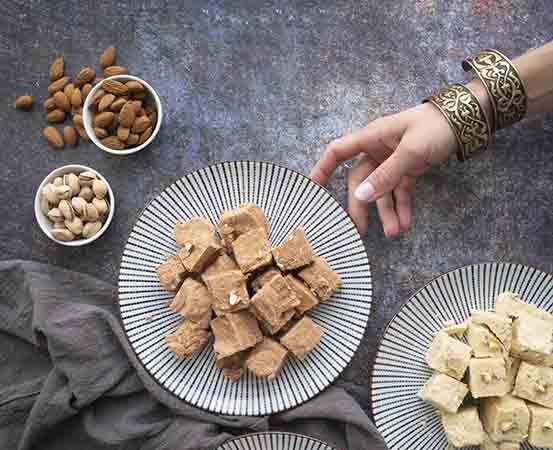
Diabetes need not become a spoilsport for your Diwali revelry. With a bit of planning, discipline and self-control, those with diabetes can partake of the festive delicacies while keeping their blood glucose levels in control.
Managing diabetes during Diwali: Pick healthy snacks
Dr Sandeep Sonawane, consultant, internal medicine, Kokilaben Dhirubhai Ambani Hospital, Navi Mumbai, says, “Often, people with diabetes set aside their dietary restrictions and indulge in sweets, savories and food rich in refined carbs along with high unhealthy fat content. This could make their blood glucose, blood pressure and cholesterol levels soar.” “However, if one exercises restraint and feasts in moderation, the blood glucose levels will not spike uncontrollably.” Experts also suggest leveling up the daily workout routine for a few weeks before and after the festival. This ensures that your body burns off all the excess calories consumed.
Dr Aditya G Hegde, consultant – diabetes and endocrinology, Manipal Hospital, Old Airport Road, Bangalore, recommends “When it comes to managing diabetes during Diwali, always try to pick healthy alternatives over the processed and sugary food items. Also make sure that you do not skip your daily exercise sessions, especially on days of overindulgence”.
A healthy main course helps manage diabetes during Diwali
Apart from making healthy choices when it comes to snacks and savories, a healthy main course is crucial to manage blood glucose levels during Diwali. People with diabetes can opt for dishes like grilled preparations of proteins like cottage cheese, tofu or dal (lentils) prepared with minimal oil. Instead of breads made with refined flour, opt for those containing whole wheat. Dr Hegde shares, “Instead of using maida, which contains refined carbs, paranthas and pooris can be made of flours like millet-based amaranth, buckwheat and rajgira. Further, traditional rice-based preparations like khichdi, pulao and pongal, can be prepared using broken wheat or millets like samak chawal (barnyard millet).”
However, can festive food ever be complete without its amazing flavor? Delhi-based dietitian Avni Kaul suggests, “Spices like turmeric, cumin and coriander can enhance the flavor of your meals without relying on excess sugar or heavy and oily ingredients.”
To round off your meals, consider preparing makhana (fox nut) kheer in skimmed milk or almond milk as a dessert. This has lower GI compared to rice kheer.
Simple ways to manage diabetes during Diwali
Here are some effective tips to manage diabetes during Diwali.
1) Have small and frequent meals
People with diabetes are likely to see a rapid rise in their blood sugar levels after having a large meal. They are also advised against fasting or staying hungry for long periods. Dr Sonawane explains that prolonged gaps between meals can lead to fluctuations in blood sugar levels. “They should consume at least five smaller meals while limiting the portion sizes throughout the day instead of three large meals,” he explains. Dr Hegde suggests opting for smaller meals after every two or three hours.
2) Eat a fiber-rich diet
Fiber-rich foods are always beneficial for people with diabetes as fiber is not broken down quickly. Hence, it does cause a sugar spike like carbs do. “Incorporating fiber-rich fruits, vegetables, and whole grains into your diet is the way to go, especially during the festivities,” says Dr Sonawane. Dr Hegde adds that it is best to snack on grilled or roasted veggies and salads. Sprouts can be a tasty and nutritious option, too.
3) Choose healthy cooking methods
If an ingredient is deep-fried and seasoned with excessive sugar or salt, it is more likely to increase both your blood sugar and blood pressure levels. Dr Sonawane suggests that when cooking for Diwali, it’s best to grill, roast, or bake snacks instead of deep-frying them so as to keep unhealthy fat consumption in check.
4) Drink enough fluids
Doctors also emphasize staying adequately hydrated because drinking water also aids gut cleansing and promotes a feeling of fullness. Dr Sonawane shares that it can also help avoid overeating.
5) Prepare sweets at home
It is best to opt for homemade sweets as you can keep an eye on carbohydrate, oil, and sugar content during preparation. Dr Sonawane suggests opting for sweeteners like jaggery, dates or honey. “You can enhance the nutritional value of sweets by incorporating nuts like almonds, walnuts, dates, or black currants while cutting down on excess sugar,” says Dr Sonawane.
Dr Hegde adds that instead of sweets rich in sugar syrup, one can opt for chikki (a brittle-like sweet made with jaggery, nuts and seeds) or less sugary granola bars prepared with oats, nuts and seeds. Munching on dates, dry fruits or even a whole fruit can satiate the sweet craving without leading to a sugar spike. However, it is essential to remember that even these modified sweets should be consumed in moderation. This is because when it comes to diabetes management, there is little difference in using honey or jaggery as a sweetener over sugar.

6) Keep a check on snacking
Experts advise that while eating festival-specific snacks like faral (a combination of carb-rich sweet and savory snacks made during Diwali) or other sweets and preparations, one should exercise moderation and avoid overindulgence. According to Kaul, some snacks like dried fruits that are high in sugar and candied nuts are best avoided.
7) Drink, but in moderation
Instead of consuming alcohol during Diwali celebrations, people with diabetes can opt for healthier beverages. “Natural drinks like coconut water or lime juice are good choices, while sweetened and carbonated beverages can be cut out,” suggests Dr Sonawane.
Takeaways
In the festive season, people with diabetes can plan their meals, sweets and snacks in advance by choosing healthier alternatives and methods of preparation. Having small meals and avoiding processed food and alcohol are some common diabetes management tips.















